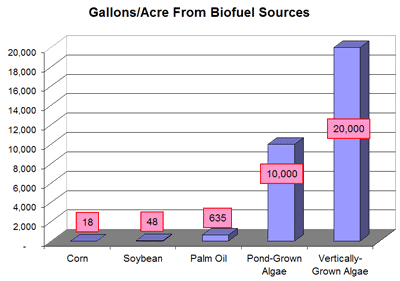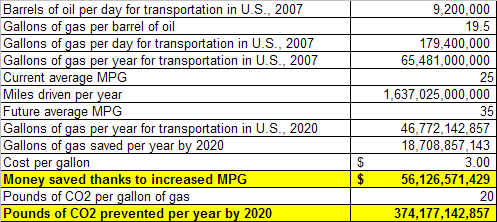 I've mentioned biofuels before and how they've been mandated to replace 25-55% of the oil we use for transportation. Today I came across an interesting company that has an innovative way to grow biofuels from my preferred liquid fuel source of the future: algae.
I've mentioned biofuels before and how they've been mandated to replace 25-55% of the oil we use for transportation. Today I came across an interesting company that has an innovative way to grow biofuels from my preferred liquid fuel source of the future: algae.Valcent has developed a closed loop vertical bioreactor (right) which grows algae extremely efficiently. It's really quite clever as it allows the algae to get access to light by funneling it through vertically hanging curtains. The system is closed and therefore conserves water as it avoids the evaporation that occurs in open pond growth systems. Here's a video.
 BIOFUEL USAGE
BIOFUEL USAGEAlgae could be the future of biofuels because it's extremely efficient. As much as 50% of its body weight is a high-grade vegetable oil. Different types can also be selected to produce different carbon chains, some better for jet fuel, some better for diesel, etc. The key measure of efficiency for biofuels is gallons per acre. As you can see from the chart on the left, algae crushes the competition.
CO2 SEQUESTERING
Algae is the fastest-growing plant on earth and sequesters the most carbon dioxide as well. So what does this mean about algae's ability to slow global warming by taking CO2 out of the air? Well, it sequesters a whole bunch of CO2, but when we burn it that CO2 is released. The net effect is that it's pretty close to being a carbon-neutral fuel source (not including the fuel involved in transporting it to its destination, i.e. your fuel tank). A U.S. Department of Energy study has shown that the production and use of biodiesel, compared to petroleum diesel, resulted in a 78.5% reduction in carbon dioxide emissions.
COST TO PRODUCE
I found this quote interesting: a Feb. 2007 article on biofuels in MIT's Technology Review said that "today's higher oil prices will make it easier for algae to compete." Note: oil was trading at roughly $60/barrel at that time. Today it's around $135/barrel. Algae is coming fast.




